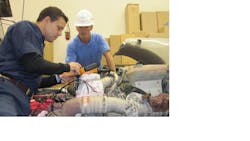Fleet experiences with 2010 engine performances vary
In terms of both fuel economy and maintenance costs, the experiences of motor carriers running EPA 2010 engines vs. EPA 2007 models is decidedly mixed, according to Transport Capital Partners’ (TCP) First Quarter 2013 Business Expectations Survey.
The survey indicates that over half of the carriers have seen fuel economy improve with the new engines - but almost 40% reported that there has been no change.
TCP said this discrepancy is even more pronounced between large carriers (greater than $25 million in revenue) and small carriers. Fifty-seven percent of larger carriers reported fuel economy improvement compared to only 32% of smaller carriers.
“Carriers differ in their measurement systems and tracking procedures, but the real story here is that very few carriers have seen a decline in fuel economy with the 2010 engines,” said Steven Dutro, TCP partner. “Most of the carriers we talk to have reported overall improvement in mpg in recent years from a combination of technology and training efforts.”
TCP also found mixed results regarding maintenance costs. Fifty-three percent of carriers said there has been no change in engine-related maintenance costs. However, 40% indicated that costs have increased.
Larger carriers were evenly split as to whether the 2010 engines cost more to maintain than the 2007 engines (47% vs. 48%). Almost two-thirds of smaller carriers indicated no change in maintenance costs, while nearly 30% said maintenance costs have increased.
According to TCP, these results may reflect that some carriers are viewing maintenance costs overall rather than by miles generated over the same early portion of the truck lifecycle, i.e., older trucks have higher costs than newer trucks.
“The differences in these responses may simply represent differences in measurement and tracking,” pointed out Richard Mikes, TCP partner. “Significantly, very few carriers report lower maintenance costs for the 2010 engines, and the majority of carriers we know say these costs have increased.”
He also observed that with carriers having adopted other changes at the same time as the new engines - such as reducing road speeds and adding trailer skirts and other aerodynamics - isolating “pure” engine effects may be difficult.
J.D. Power and Associates found similar issues in its 2012 “U.S. Heavy-Duty Truck Customer Satisfaction Study,” released last year.
That firm found that heavy-duty customer satisfaction declined to 737 index points on a 1,000-point scale in 2012, compared with 751 in 2011, primarily due to an increase in the number of problems experienced.
Furthermore, the study finds that the quality of Class 8 trucks that are one model year old has decreased, with problem levels rising 9% to 223 problems per 100 trucks (PP100) in 2012 - up from 204 PP100 in 2011.
J.D. Power said that overall quality is determined by the level of problems experienced per 100 trucks, with a lower score reflecting higher quality and that “much of the overall quality decline is attributed to a higher rate of engine- and fuel-related problems, which have increased by 14% from 2011 (81 PP100 vs. 71 PP100, respectively).”
The firm noted that the “most problematic engine and fuel problems are driven by technology that is designed to reduce emissions from heavy-duty truck engines.”
“Following the revised EPA regulations in 2007, there was an increase in problems and a decline in customer satisfaction, and we anticipated the same thing would happen with the introduction of 2010 EPA-compliant engines,” said Brent Gruber, director of the commercial vehicle practice at J.D. Power and Associates.
“Emission-related technology results in a high rate of problems, particularly with ECM calibration, exhaust gas recirculation (EGR) valves and engine sensors,” he continued. “The new, more complex engines are resulting in more problems and downtime.”
TCP’s next Business Expectations Survey will launch in May. Carriers interested in participating can go to transportcap.com/industry-survey for more information.
